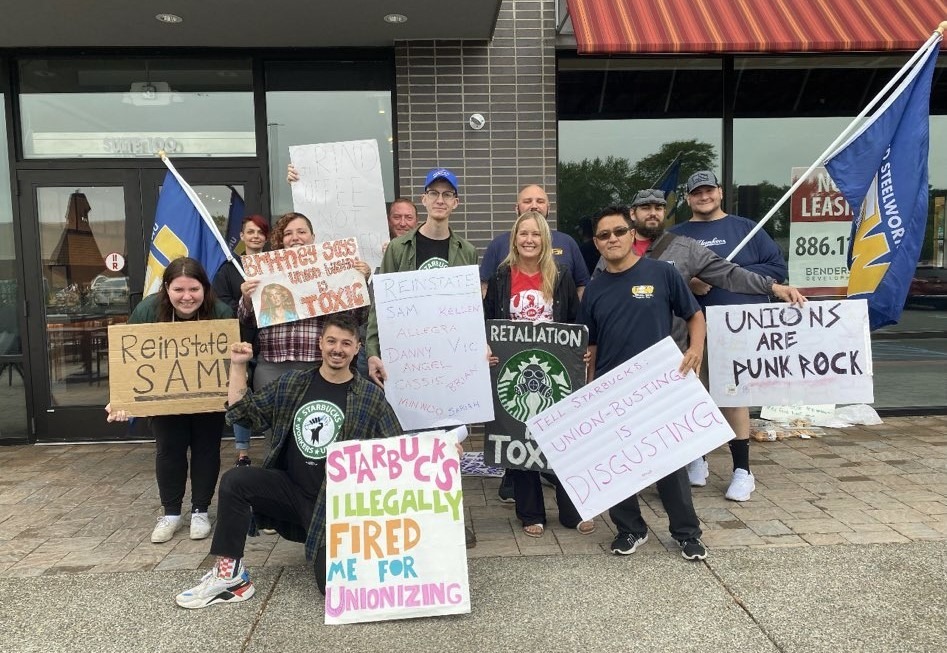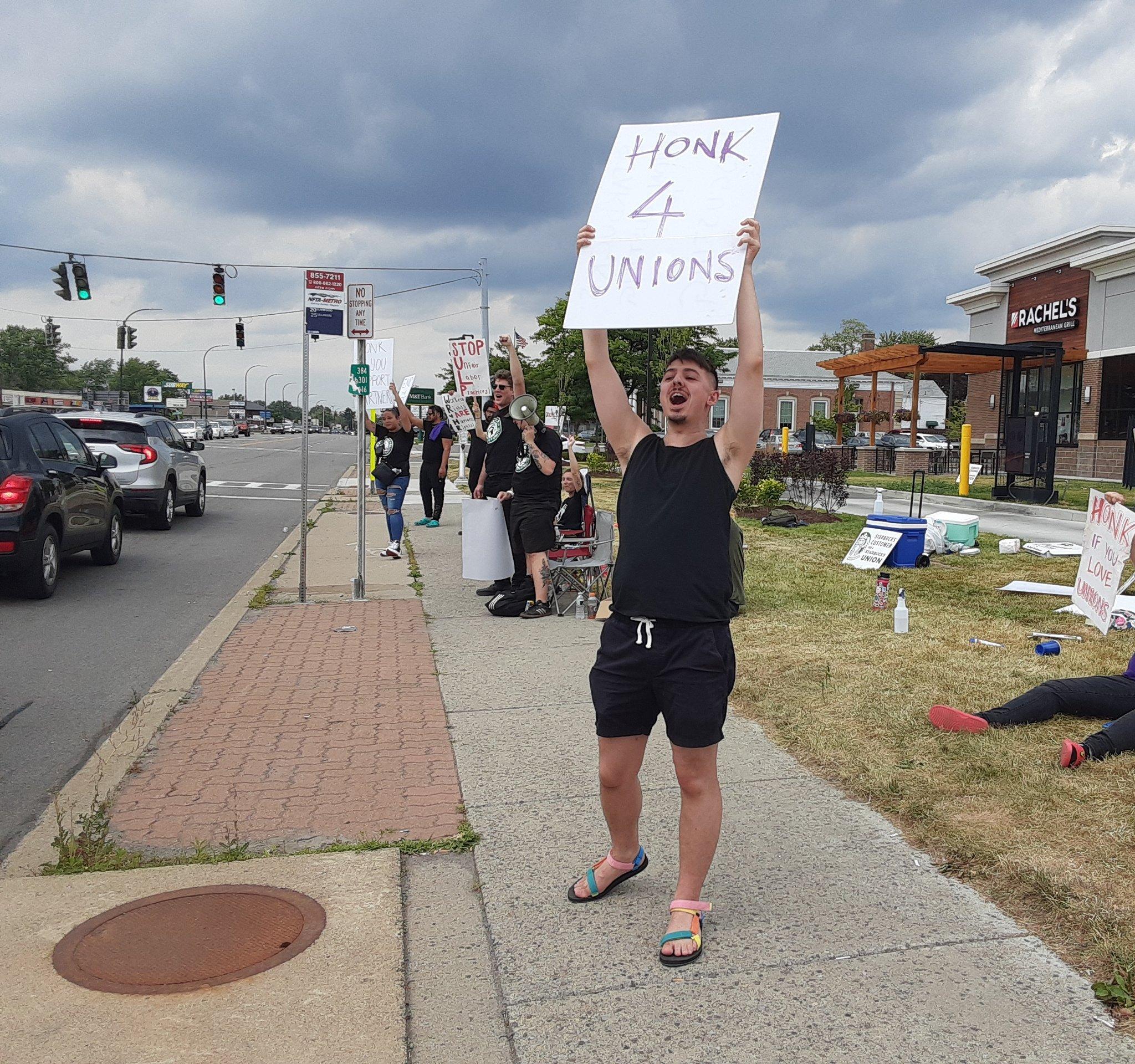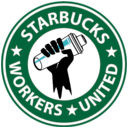Editor’s Note: This article is the introduction to a series. Part One will cover Starbucks’s union-busting techniques. Part Two will cover the power of collective action against Starbucks. Part Three will conclude with a discussion of the role of militant labor in making workers a political force again in the United States.
Buffalo, NY is a union town–the epitome of a melting pot with immigrants and longtime residents that hail from all over the world. If you live in the Buffalo-Niagara region of New York you are twice as likely (21.1%) to be in a union as the average US resident. So it’s no surprise that this mecca of proletarian power saw the first three Starbucks stores file petitions to unionize.
On August 30, 2021 the first group of workers filed to unionize their shops. Just a few months later, workers at the Elmwood Ave. store went union: Starbucks Workers United had its first victory, with workers voting more than two-to-one to unionize.
Objectively, it’s hard to measure the national impact of what this brave collective of Starbucks workers standing up and saying, ”Union Yes,” has had on the labor movement. But there is no doubt that it forced then retired CEO and Bernie Sanders-hating sociopath billionaire Howard Schultz to quiver in his penny loafers. Schultz came back from retirement to take the helm of the international bean brewing behemoth, but unlike George Foreman, his comeback has been a flop. Since the first store on Elmwood unionized, eight more Buffalo area stores have also certified, and across the US over 230 more stores have joined the union with hundreds more organizing. Over 52 of these union elections have been unanimous.
While these statistics provide an impressive face to the national movement, it is easy to lose sight of the real day-to-day struggles of the workers involved, and cruelty inflicted by the management’s attempt to thwart organizing.
Winter Caucus sat down to talk to Jon, a Buffalo Starbucks organizer and Winter Caucus member, to find out what the fight has been like on the frontlines. He has worked at two of the union stores – one located at Sheridan & N. Bailey and the other at Delaware & Chippewa – and has seen various treacherous tactics from the Starbucks’ bosses.
“One of their most consistent tactics has been short staffing,” Jon said. “Starbucks fires organizers and pro-union workers and they can’t hire enough people to make up for the losses, and then we have problems running the store properly.”
Short staffing makes working conditions and workers’ lives more miserable and stressful, but it also impacts the customers who, because there are too few workers in the store, don’t get the quality of service they deserve. Starbucks and most other businesses like to pretend they care about the customer and “customer experience,” but when it’s in conflict with profit and keeping iron-fisted control over the business, profit and control win nearly every time.
Not having enough workers causes peripheral issues as well.
“We had this homeless guy who would come into the store and be disruptive,” said Jon. “Nothing against him, he has issues he is dealing with. But he threatened to kill one of our co-workers and management didn’t do anything. A co-worker ended up quitting because she couldn’t deal with the added stress.”
Speed up is a dirty old trick the bosses have used for more than a century – both to get more work with fewer workers and to break people’s spirit. When there are not enough workers and the whole crew is putting the pedal to the metal for the entire shift, no one has time to talk union or build the kind of personal relationships that build solidarity.
Jon also pointed out the practice of cutting workers’ hours. “They also cut people’s hours back so much that they have to get another job and then the bosses will fire the person because they don’t have enough availability to work,” Jon said. “Another trick they use is to schedule you for four hours, five days a week, and then it’s very difficult to get to talk to co-workers because you only get one 10 minute break during that shift, and again really throws a wrench in building union solidarity.”
In fact, it is these face-to-face relationships between workers that form the bedrock of a strong union – not, as Starbucks consistently tries to portray, the shadowy forces of “outside” union bureaucrats. But while management takes aim at the relationships between workers to break the union, these bonds are simultaneously the strongest weapon for workers to fight back.
Starbucks also uses this false notion of unions to stop fair bargaining in its tracks. “When we make requests to bargain, they stall, they cease shop meetings, and they go over workers’ heads to ask the union lawyers to ‘verify’ we are union members. They don’t want to recognize that the union is the workers, they want to force it into being a 3rd party without workers at the table” Jon added.
 Info picket in Buffalo, September 6, 2022
Info picket in Buffalo, September 6, 2022
Another tactic that has been seen repeatedly is the denial of Weingarten Rights. If a manager requests to have a meeting with a union member, contract or not, workers can cite their Weingarten Rights to require a union representative (shop steward, union lawyer, etc.) present for any meeting that can lead to discipline or firing.
Jon said in his case, “only a couple weeks ago, my manager had me sit down for a meeting, she was giving me a formal write-up for being late. When I cited my Weingarten Rights to have a union rep present she said that those rights only apply in the case of ‘discovery meetings’ which is just completely false. Two days later she fired another co-worker while also denying their Weingarten Rights”.
One of the workers, Sam from Sheridan & N. Bailey, who worked at Starbucks for 13 years got fired after he made a video about Starbucks’ lousy health insurance. He was dealing with getting treatment for a tumor that left him in serious medical debt and the company signed paperwork just 10 days after the video was released, waiting for the slimmest of pretense to fire him.
Ultimately, Starbucks fired Sam for a routine decision he didn’t even make, by a new manager no less that had only been with the company for less than eight months. On a day with only 3 workers on the floor, the shift-supervisor decided to lock the lobby and only operate the drive-thru, something that is within store policy to do. And yet, they fired Sam later for this without any discussion or rationale for what was a perfectly acceptable decision before they unionized.
What followed was the entire shop walking out in solidarity with Sam, and a month-long strike to reinstate him. Buffalo Democratic Socialists of America (DSA) members, including many in Winter Caucus, turned out to support the picket. Starbucks tried to bring in scabs to run the store, but the picket turned away customers at such a rate that they only operated the drive-thru with two people. While reinstatement is still pending, the strike at Sheridan & N. Bailey took a shop that was making ~$80k a week in sales and reduced it to a trickle.
 Sam on the picket line. Despite being fired, he still fights.
Sam on the picket line. Despite being fired, he still fights.
Sam is not the only worker who has been fired. At least 10 union supporters have been fired in Buffalo, and the best estimate is that 92 Starbucks workers across the country have been fired for union activity. Firing someone for organizing a union is a blatant violation of Section 7 of the National Labor Relations Act (NLRA), which states:
“Employees shall have the right to self-organization, to form, join, or assist labor organizations, to bargain collectively through representatives of their own choosing, and to engage in other concerted activities for the purpose of collective bargaining or other mutual aid or protection, and shall also have the right to refrain from any or all of such activities.”
But despite this seemingly strong language of the NLRA, workers all over the country continue to be fired and punished for legal concerted union activity. The courts exist to serve Capitalists, so the bosses often get away scot-free or at worst with a small fine for firing a worker illegally. Notably, the NLRA provides no monetary penalties on the employer for retaliation, beyond pay for the lost work hours.
Workers facing violations of their NLRA rights can’t file claims in court on their own; instead they must rely on the National Labor Relations Board (NLRB) to act on their behalf. Although the NLRB under the Biden administration has shown some support towards unionizing workers, the board suffers from many vacancies, and slow-moving procedures that result in cases taking months or even years to resolve. In the meantime, fired workers must turn to other jobs or face unemployment.
It’s approaching a year since the Elmwood Ave. store voted to unionize last December, and they still haven’t gotten a contract. This is far from unusual for a first contract negotiation, but the Starbucks’ bosses use this as a form of harassment in their day to day management strategy.
Since the negotiations have been going on, store managers tell workers that they need to negotiate for any work rules changes, but they don’t hold shop meetings where any rules can be discussed.
“And then they make rule changes that conflict with existing store policies,” Jon said. “Once again they have it both ways and we workers get the short end.”
That’s been the case for many years now – the bosses have it both ways, and workers get the short end. But maybe rickety old Bob Dylan had something way back in the day when he sang about how the times, they were a changing. His timing may have been off, but the rise in labor militancy and new organizing that has percolated up in the last few years is inspiring: each new round of unionizing activity gets bigger, since workers see they can fight back against the bosses if they stick together. This is what capitalists like Howard Schultz are afraid of.
“Starbucks is more prepared to play the long-game,” Jon said. “The only way for workers to prevail is to maintain solidarity in the face of it.”
While ultimately the act of organizing is one led by the workers themselves, support from other labor organizations, socialist organizations like DSA, and the general public can provide an important sense of solidarity with the workers, and pressure on Starbucks leadership.
Currently in Buffalo, the union has been preparing to call on customers to boycott Starbucks in the region unless the 10 fired union supporters are reinstated by September 15th. An info picket was held across all shops in the region on September 6th, with scores of other local unions like CWA, SEIU, USW, and UAW joining the picket line. Many Buffalo DSA members, including those in Winter Caucus, participated and helped with organizing these events.
It remains to be seen whether these actions will ultimately force the hand of management, but one thing is clear: the struggle has only just begun.
 We highly encourage signing SBWU’s pledge to act in solidarity with the union.
We highly encourage signing SBWU’s pledge to act in solidarity with the union.

